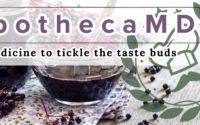Functionalization of Pasteurized Milk Using Rosemary, Thyme, and Ammoides Aqueous Extracts for Better Microbial Quality and an Improved Antioxidant Activity
Molecules. 2022 Jun 9;27(12):3725. doi: 10.3390/molecules27123725.
ABSTRACT
This study aimed to evaluate the effects of thyme (Thymus vulgaris L.), rosemary (Rosmarinus officinalis L.), and ammoides (Ammoidespusilla L.) aqueous extracts supplementation on the quality of heat-treated (55, 65, and 75 °C) raw milk (sample lots: A, B, and C) and cold-stored pasteurized milk (lot D). The three herbs have shown rich polyphenol contents (32.65-104.23 mgGAE/g), relevant antioxidant capacity, and high caffeic and rosmarinic acids and catechin contents. A significant reduction in psychrotrophic and total viable bacteria counts (PC and TVC) was attained following milk extract supplementation in both experiments. Monitoring PC and TVC counts in sample lots (A, B, and C) has revealed a significant improvement in extracts’ effectiveness in reducing the TVC count with the increment of temperature. The highest reductions of PC and TVC counts were achieved, respectively, in samples treated with thyme and rosemary in (lots: A, B, and C) and in samples treated with ammoides and thyme in (lot D). Thyme extract showed the highest milk serum DPPH scavenging activity (74.84% at 0.1 mg/mL) and induced a significant Listeria monocytogenes growth inhibition (>1 Log cycle). The sensory evaluation of supplemented milk has shown good consumer acceptability of ammoides-supplemented milk, quite similar to the control sample.
PMID:35744853 | DOI:10.3390/molecules27123725

